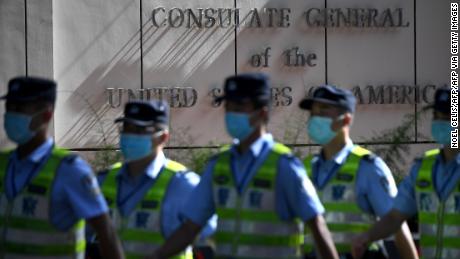The Chinese government gave the Americans the same 72-hour time frame to close their Chengdu mission as Beijing had been given in Houston last week.
As that deadline expired, the Chinese Ministry of Foreign Affairs said in a statement Monday that the Chengdu consulate closed at 10 a.m. “Relevant Chinese authorities then entered from the main entrance and took over,” the ministry said in a statement posted on Chinese social media platform Weibo.
Over the weekend, hundreds of people had gathered outside the US consulate in the city of 16.5 million people, taking selfies and waving Chinese flags.
On Saturday, the US insignia was taken down, while on Sunday removal work began on a plaque outside the embassy and shipping containers were loaded onto trucks, as staff prepared for the consulate to be closed.
Chengdu, the capital of China’s southwest Sichuan province, was an important diplomatic outpost for the US, covering a large swath of the country, including the controversial Tibetan Autonomous region.
“Today, we bid farewell to the US Consulate General in Chengdu. We will miss you forever,” the mission’s official post said.
Espionage allegations
US officials told reporters Friday that staff at the Chinese consulate “were directly involved in communications with researchers and guided them on what information to collect.”
According to a senior State Department official, the idea to close the Houston consulate emerged this spring after China interfered when US officials returned to the consulate in Wuhan to retrieve diplomatic materials.
The Chinese Foreign Ministry called the closure of the Houston consulate an “unprecedented escalation” of ongoing tensions between the two countries.
“The current situation between China and the United States is something China does not want to see, and the responsibility rests entirely with the United States,” the Chinese foreign ministry said in the statement.
US-China tensions rise
Tensions between the US and China have been strained by the ongoing trade war, allegations over the coronavirus pandemic and US criticism of human rights abuses in both Hong Kong and Xinjiang, which Beijing denies.
“As President Trump has made very clear, we need a strategy that protects the American economy and indeed our way of life. The free world must triumph over this new tyranny,” Pompeo said.
“The truth is that our policies — and those of other free nations — resurrected China’s failing economy, only to see Beijing bite the international hands that were feeding it. We opened our arms to Chinese citizens, only to see the Chinese Communist Party exploit our free and open society.”
CNN’s James Griffiths contributed to this write.



